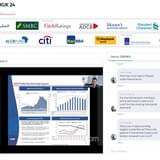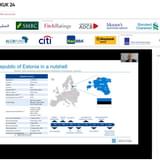In contrast to the two aforementioned countries, Moody’s retained its sovereign ceiling for Turkey at Baa3, which enabled some credits to be notched higher than the sovereign and retain their IG ratings. Valuations of Turkish corporates and banks remain attractive compared to their EM counterparts, and recent bond issuances from the sovereign and a few banks has demonstrated that the access to the market remains, albeit at a slight premium.
Moody’s sovereign credit rating downgrade of Turkey reversed the fortunes of the country’s corporates and banks. US$22bn of Turkish banks’ debt was impacted following the downgrade, versus less than US$5bn worth of corporate debt. Although historically, banks have traded tighter to the sovereign compared to Turkish corporates, the downgrade has reversed this trend, to the benefit of corporates.
The downgrade was indiscriminative between the fundamentals of private and state-owned banks. Despite the fact that the former had been rated IG three years before the sovereign obtained a similar status from Moody’s in 2015, Turkish private lenders were downgraded together with the sovereign in September 2016.
Conversely, corporates have preserved their investment grade ratings, and their outlooks have been revised to stable. It is surprising to see private banks being downgraded in line with the sovereign from IG to junk, as none have more than a 14% market share of total banking assets and their shareholders are some of the top tier private conglomerates, which have demonstrated in the past their willingness and ability to provide additional financial support. Even in the case of Garanti and Yapi Kredi, where the majority shareholders are European banks, namely BBVA and Unicredit, their ratings were nevertheless lowered to sub-investment grade.
Moody’s was particularly concerned about the deteriorating macroeconomic backdrop, which could put pressure on the asset quality of all banks and hamper their ability to refinance foreign currency debt. The ratings agency also questioned the capacity of the government to provide financial support to the sector if needed.
Whilst the slowdown in economic growth is a factor behind rising NPLs in the banking system, it is of note that Turkish banks have operated under some challenging conditions for the last two years (from increased domestic political uncertainties associated with presidential elections to the volatility of Turkish lira), during which they have demonstrated resilience and ability to preserve profitability and maintain high capital ratios. Their high cost absorption capacity was supported by the regulator, which adopted more conservative measures to slow down consumer lending.
As a result, it was largely anticipated that Moody’s could have been more forgiving on some of the largest private banks in maintaining their investment grade ratings. The focus is now on Fitch as any downgrade of the sovereign to junk could impact banks’ capital from higher-risk weighted assets (RWA). The regulator uses Fitch’s rating for RWA, which allow banks to use 50% risk-weight for both FX securities and FX reserves. A potential downgrade to junk would increase that weight to 100%, which is expected to have an up to 150bp negative impact on banks’ capital ratios.
Moody’s recent rating action on Turkey and its financial sector brings into question the consistency in the credit ratings of banks across EM countries. For instance, Indian banks maintain their IG ratings despite facing a sharp and continuous deterioration of asset quality, with NPLs north of 5% for the whole banking system. The sector is largely dominated by quasi-sovereign banks which have an endemic shortage of capital.
By contrast, Turkish banks’ NPLs remain relatively low, and were circa 3% in H1 2016. Further deterioration is expected to be gradual and manageable. The top tier Turkish private banks are slightly better positioned to weather the deteriorating macroeconomic backdrop than their quasi-sovereign peers due to their diversified shareholder base and the tested willingness of their shareholders to support the banks in times of need (such as during the financial crisis in 2001).
One area of particular concern for investors, which has been widely monitored, is corporate foreign currency (FX) exposure. As financial intermediation is largely conducted by banks in Turkey, this concern is also reflected back on banks, and their balance sheets are more transparent to provide information on that exposure. Currently about 60% of all hard currency funding for corporates is provided by local banks, according to data from HSBC. Some estimates are that corporates’ short FX positions stood at US$201bn as of July 2016, whilst Turkish banks’ FX loans to Turkish corporates was US$172bn, according to BAML. A major stress test for that exposure would be a potential sharp depreciation of TRY.
With the previously mentioned global economic backdrop and global search for yield, Turkish fixed income assets do offer value compared to similarly-rated peers across EM. Turkish private banks have historically traded tighter to the sovereign, which reflects their willingness and ability to prioritise foreign debt service, as they have demonstrated in the past. Not surprisingly, these entities were the first to issue Eurobonds, which then paved the way for corporate issuance. For the last two years, the top four Turkish private banks’ credit curves have rarely traded above 120bp against the sovereign, whilst in Russia senior bank debt traded 200bp versus the sovereign and in Brazil the pick-up was on average 150bp, which widened to 300bp during the sell-off.
Following the recent downgrade, Turkish banks’ spread to the sovereign has widened to about 170bp, whilst corporates have been trading inside 100bp. Technicals in both corporates and banks have been cleared as index-related selling, which has been largely offset by EM investors covering their underweight positions. This would allow for some spread compression in the medium-term, especially as supply pressure clears away. The recent surge of bank senior debt issuance has been surprising as it was largely unexpected to be this year, and is mainly concentrated in subordinated debt. This could favour corporates’ secondary curves, despite their tight valuations against the sovereign, as they have strong financial metrics, benefiting from IG ratings and thus a wider investor base.
It is clear that corporates and banks have weathered the downgrade of the Turkish sovereign by Moody’s well. However, the event questioned the quality of institutions in Turkey, which have long been praised for their resilience and ability to remain independent. It also clouded the investment sentiment and eroded some of the confidence surrounding Turkey, although investors remain comfortable with current valuations and continue to add to their exposure. Turkish banks offer better value given their fundamentals compared to similarly-rated peers in Russia and Brazil, however they lack the popular IG bid which helped them to diversify their investor base. This investor base has been captured by the IG Turkish corporates, although they offer limited sector diversification and a lack of depth on their yield curve.
Turkish fixed income assets are likely to remain resilient as long as risk appetite stays strong. A risk-off environment will test investor appetite for Turkish risk and local support will remain critical to maintaining investor confidence. Prospects will hinge on global economic and the geopolitical risk outlook, which has remained largely underprised and extremely convoluted.







